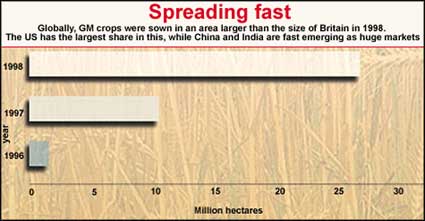Genetically modified, and spreading
 Cultivation of genetically modified (GM) crops is increasingly becoming popular. Supporters of biotechnology feel that GM crops are the answer to the problem of food security and will curb the excessive use of harmful chemical pesticides. Critics argue that GM crops could wreak havoc with the environment. They warn that there is a clear danger of pests developing resistance to GM crops. There are fears about GM crops' impact on human health. And then there is the question of customers being aware of contents of their foodstuff through labelling. But there is no labelling system that can fully inform the lay person of all the risks. As both sides prepare for a long-drawn battle, the area under GM crops is increasing all the time. In 1998, it was greater than the size of Britain.
Cultivation of genetically modified (GM) crops is increasingly becoming popular. Supporters of biotechnology feel that GM crops are the answer to the problem of food security and will curb the excessive use of harmful chemical pesticides. Critics argue that GM crops could wreak havoc with the environment. They warn that there is a clear danger of pests developing resistance to GM crops. There are fears about GM crops' impact on human health. And then there is the question of customers being aware of contents of their foodstuff through labelling. But there is no labelling system that can fully inform the lay person of all the risks. As both sides prepare for a long-drawn battle, the area under GM crops is increasing all the time. In 1998, it was greater than the size of Britain.
Related Content
- GM mustard clears hurdle in India but more remain
- WHO paves way for use of genetically modified mosquitoes to combat Zika
- Mosquitoes genetically modified to be infertile in bid to reduce spread of malaria
- US scientists breed genetically modified mosquitoes that resist malaria parasite
- Highly efficient Cas9-mediated gene drive for population modification of the malaria vector mosquito Anopheles stephensi
- Are GM crops better for the environment?
